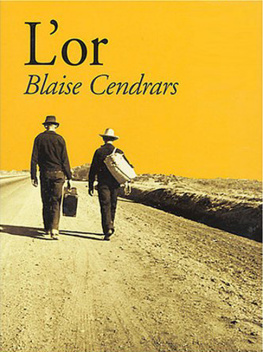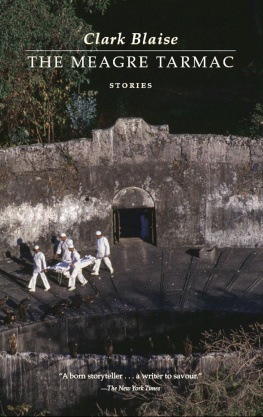Blaise Cendrars - Planus
Here you can read online Blaise Cendrars - Planus full text of the book (entire story) in english for free. Download pdf and epub, get meaning, cover and reviews about this ebook. year: 1989, publisher: Peter Owen Publishers, genre: Non-fiction. Description of the work, (preface) as well as reviews are available. Best literature library LitArk.com created for fans of good reading and offers a wide selection of genres:
Romance novel
Science fiction
Adventure
Detective
Science
History
Home and family
Prose
Art
Politics
Computer
Non-fiction
Religion
Business
Children
Humor
Choose a favorite category and find really read worthwhile books. Enjoy immersion in the world of imagination, feel the emotions of the characters or learn something new for yourself, make an fascinating discovery.

- Book:Planus
- Author:
- Publisher:Peter Owen Publishers
- Genre:
- Year:1989
- Rating:5 / 5
- Favourites:Add to favourites
- Your mark:
- 100
- 1
- 2
- 3
- 4
- 5
Planus: summary, description and annotation
We offer to read an annotation, description, summary or preface (depends on what the author of the book "Planus" wrote himself). If you haven't found the necessary information about the book — write in the comments, we will try to find it.
Planus — read online for free the complete book (whole text) full work
Below is the text of the book, divided by pages. System saving the place of the last page read, allows you to conveniently read the book "Planus" online for free, without having to search again every time where you left off. Put a bookmark, and you can go to the page where you finished reading at any time.
Font size:
Interval:
Bookmark:
Planus by Blaise Cendrars
Edited and translated from the French by Nina Rootes
93, 041 Words
This second volume of an amazing autobiographical series to be published in English is full of verve, humour and excitement. The inimitable Cendrars recounts his adventures in various parts of Europe, including a hilarious visit to a brothel, his voyage as a deck-hand in a Greek dinghy smuggling wine into Italy, a great brawl in an Amsterdam restaurant and his meeting with Remy de Gourmont. And he tops up this rich pot-pourri with personal anecdotes about Picasso, Modigliani and others.
The French title of Blaise Cendrars's long work, Bourlinguer, is virtually untranslatable into English. It means 'to knock about the world, to lead an adventurous life' and has also a nautical connotation. In looking for an English title, I took the cue from Cendrars himself, and the reader will find the explanation of 'Planus' on page 45 of the present edition.
In cutting the work down to the length suggested by the publishers, I have tried to omit whole sections which are self-contained in the French original rather than nibble piecemeal at the text. I regret the loss of many pieces, but the heart and soul of the book are still here, and I have not allowed myself to lose sight of the two main themes: life and books.
I have reversed the sequence of two parts, so that 'Antwerp' now precedes 'Corunna'. The latter is in the way of a digression and, in my view, less suitable as an opening section than the former. The part now entitled 'Naples' appeared as 'Genes' (Genoa) in the French edition. My reason for making this substitution is that the bulk of the material in this section concerns Naples (the episodes in Genoa occur only at the end) and Cendrars himself might well have called it 'Naples' if he had not already used that as the title of another piece, not included in the present volume.
My humble apologies to the ghost of Cendrars for tampering with his work. But I hope this shortened version will introduce many readers to the delights of his writing, who perhaps would have been deterred by a longer and more discursive book.
Ama et fac quod vis!
"It was a melancholy humour, and consequently a humour most alien to my natural temperament, produced only by the affliction of solitude in which I have been plunged for some years past, that first put into my head this notion of writing. Furthermore, finding myself entirely empty and devoid of any other material, I havetaken myself both as argument and subject-matter. It is a wild and monstrous plan. Indeed, the very oddity of it is the only point worthy of note, for, to such a vain and worthless subject, even the finest craftsman in the world could give neither form nor content of any merit whatsoever."
Montaigne
To Jacques-Henri Levesque, poetry-lover, who is today prospecting in New York
--- Blaise
Among the many scandalmongers in Paris there is the type who, once you have given up living in the capital, comes to visit you in the country, tracking you down even as far the Midi, and then, under pretext of his admiration for your work and his own passionate addiction to literature, proceeds to waste your time by telling you nothing but stale gossip and spiteful tittle-tattle. One of these backbiters told me that t'Serstevens was spreading nasty stories about me.
'I am amazed at t'Serstevens doing such a thing. He's an old pal of mine. What's he saying, then?'
'He says you are outrageous, Cendrars, and claims you are the only man he's ever known who is capable of getting the goods on tick in a brothel!'
I threw the bloody fool out and wrote to t'Ser to find out what it was all about. T'Ser, who is in fact my oldest companion in letters, reminded me by return post that I had told him, in 1912 or 1913, how I frequented the little brothel on the rue Mazet and had a free doss there.
He had got his facts muddled; this happened to me in 1910 at Julia's establishment in Antwerp, in the port, and not in rue Mazet, where there was only one woman available, Madeleine the Scissors, a Jewess as lame as the Spanish Venus, vindictive and grasping. She gave rapid service, since, working alone, she had no time to waste between one ring at the doorbell and the next. The local painters queued up outside her door, and to tell the truth, Madeleine the Scissors was a real bungler a la Goya; but at Julia's place in Antwerp, in 1910, it was all very pleasant and easy-going, the house was well patronized, nobody badgered you to get on with the job, and there was time to chat with the girls, who sat about knitting, just as if they were at home with their families; there was a cheerful, friendly atmosphere and we even took the girls out for a stroll round the town, or in the country, and let me say straight out what kind of credit I enjoyed at Julia's: I had a room, a room which the Madame had put at my disposal thanks to the intercession of a girl, a room which in theory I rented but in fact never paid for as I hadn't a sou; a room, yes, I had a room, on tick, in a brothel in the port, but I slept there alone, for, in every country in the world, the charity, generosity and tenderheartedness of the girls, indeed the infatuation one of them may have for you, or the romantic interest she feels towards a client, stops short, if I may put it this way, with the flirtation at the door. Well, what can you expect business is business, and the girls have their principles and you would have to be a Tolstoy to believe otherwise. Ah! These men of letters in their ivory towers, the things they imagine! You can screw the whole world free of charge, but not one whore in a whore-house, unless you are her pimp, but then in his own way a pimp is still an upholder of the law, which my friend Korzakow and I most assuredly were not. In Belgium in 1910, Korzakow and I were down and out together, joking, grousing, brawling, making fun of everything, as free as a couple of emancipated slaves, and cynically preferring a bottle of cognac, even the non-vintage stuff, to a well-staffed brothel, the bottle taking the place, for us, of guiding light and conscience. Nevertheless, it was at the beginning of that winter of 1910, in Antwerp, that my friend Korzakow was to leave me, take a wife for himself and settle down, as they say. As for me, after enjoying the famous room at Julia's for a while, I was to sign on with the Uranium Steamship Company, whose registered offices were in Amsterdam, and to shepherd the most wretched emigrants from Europe, from Libau to New York, which meant that I saw in the New Year in St John's, Newfoundland. But that is another story.... That is the beauty of a port once you are clear of the boom, a ship can carry you anywhere, to the Antipodes. It can circle the planet before bringing you back within sight of the lighthouse, twinkling like a lamp in the family circle, a red light bearing a high number, or a bottle of non-vintage cognac, and there is Antwerp in the fog, you are back once more in
He was a sailor from the Black Sea who had taken part in the mutiny on the battleship Potemkin and had deserted. He often spoke to me of Lieutenant Schmidt and Maria Spiridonowa, and even carried her photograph on him; but then, what Russian at that time had not been more or less involved in the revolution of 1905-8, and photographs of the heroic martyr were on sale in aid of the relief fund for revolutionary socialist emigrants. I no longer remember how I got mixed up with Korzakow. He was a regular at the bar on the rue Cujas, the 'Faux-Monnayeurs' bar, and so was I, and there were a good hundred of us, all more or less dubious characters, who made ourselves at home in this establishment, coming and going, hanging about night and day in a room to one side of the bar, standing up, hat on head, as if we were in a synagogue (there was a strong Jewish element), making a human hedge round the tables where ferocious card-games went on, anarchists yapped at each other, their arguments flaring up constantly like a blazing fire, taxi-drivers spent the night in mysterious confabulations, students from the Sorbonne pored over their textbooks, and there was not a woman to be seen, except the simpering little soldiers of the Salvation Army who tried to palm off their silly rag on us it was fit for nothing but wiping your arse and the sibylline and sibilant touts, the 'comrades' who sold brochures on birth-control and the rights of unmarried mothers, the night-owls of the Boul' Mich', mute, grubby, intoxicated, reeking of absinthe, and the famished creatures who outnumbered those lucky devils who were eating a plate of sauerkraut, a sandwich, a plateful of mussels, onion soup, hot sausages, a sou's worth of chips in a paper cone or a saucerful of winkles, the bums feverishly chewing peanut shells to appease their chronic hunger-pangs, the cadgers standing downwind from a smoker to inhale the smoke drifting from his pipe, and certain poor wretches so worn out from tramping day and night in pouring rain through the interminable streets of Paris that no sooner were they inside the overheated bar than they pissed themselves out of sheer exhaustion. They sat there dripping. That was poverty. A sediment. A human substance precipitating in suspension.
Next pageFont size:
Interval:
Bookmark:
Similar books «Planus»
Look at similar books to Planus. We have selected literature similar in name and meaning in the hope of providing readers with more options to find new, interesting, not yet read works.
Discussion, reviews of the book Planus and just readers' own opinions. Leave your comments, write what you think about the work, its meaning or the main characters. Specify what exactly you liked and what you didn't like, and why you think so.







